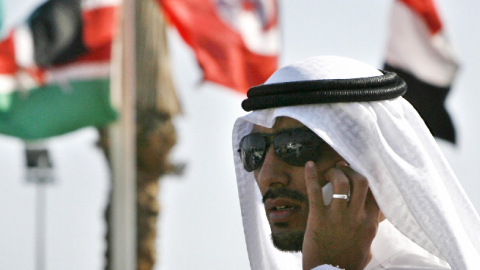One of the inescapable problems of political life in the Middle East, as a Kurd from Iran once told me, is that 'everyone has a map of their own'. Indeed, the standard map tells us only so much about how the region sees itself and very little about the real contours of the political struggles and wars inside it. The borders and institutions of sovereign states in the region have always rested on shaky foundations. Before the launch of the nation-building projects in Turkey in 1923 and Iran in 1925, the 'Lands of Islam' had no indigenous tradition of national or republican government, only of empire and tribal-rule. To many observers in the 1950s, it came as something of a surprise when much of the region chose to organise itself into nations in the process of decolonisation. From the start, however, state-formation faced stiff resistance and ruling regimes came to rely more and more on force to maintain themselves and their maps.
The state collapses and half-collapses of the 2011 Arab Spring revealed something that many regimes – and not only the Arabic-speaking ones – had been trying to keep hidden for decades: that the countries they claimed to rule were republics in name, but not in substance.The situation has become more favourable than ever to the forces of radicalism.
We've since seen two broad dynamics come increasingly to the fore, both of which track closely with historical modes of politics in the region. The first has been to 'go small': as certain nations have lost their power and sway, their societies have increasingly come to be shaped by an older politics based on ethnicity, tribal affiliation, and above all, on religion. The fissures and divisions that have opened up inside countries have become the locus of a new contest for power and influence. The countervailing tendency that this has produced has been to 'go large,' and try to build a new political order on the basis of various forms of political Islam.
Fanaticism is a part of this. But there is also a more familiar human dimension at its root. After all, we have always had good reason to prefer the security of large organisations to life in vulnerable micro-polities. The enclaves produced through the weakening of nations have all looked to outside patrons for security and support. That help has come, though principally from within the region itself, and many of the remedies it brought have been far worse for those nations – and indeed for the state-based order – than what ails them.
The emerging situation resembles a reversion to a 'pre- Sykes-Picot' order, only without an Ottoman Empire around to determine the relations of the various peoples to one another. That is not to say that many do not aspire to play this overlord role. The Islamic Republic in Iran has been pursuing it since 1979 and myriad Sunni Islamist movements have followed suit, with the so-called Islamic State ( ISIS) being only the latest and probably not the last. The current leaders of Turkey's AK Party have liked to claim that they, too, are uniquely situated to rule the region as the heirs to the Ottomans. To be sure, there are many who desperately want deeper Turkish involvement as the more sober alternative to the others. But Ankara has so far been reluctant to give this support, perhaps out of a desire to reduce its own vulnerabilities, but also perhaps because its national security calculations have been muddled by sectarian ones.
The competition between these aspiring overlords and subnational ideological movements has wrought havoc on the state-based order and, as we've seen in Syria and Iraq, it can break loose and act as a terrifying flood. The situation has become more favourable than ever to the forces of radicalism. Before 2011, the disputes within Sunni Islamism were largely, though not only, shaped by the Muslim Brotherhood and salafi-jihadism led by al-Qaeda. The Brotherhood was better situated to take advantage of the 2011 uprisings, in part because its utopian underpinnings had come to be tempered (perhaps not entirely) by its pragmatic embrace of the nation-state. But whatever opportunities there were to incorporate the Brotherhood into new national compacts have now been missed — save perhaps in Tunisia, where a combination of weak organisation and forward-looking leadership have brought the Ennahda movement, for the time being, into a working relationship with republican actors. With the Brotherhood in relative decline, the centre of gravity of intra-Sunni Islamist rivalries has shifted decidedly in a more radical direction, now resting between al-Qaeda and ISIS.
The other great beneficiary of the current situation has been the Iranian regime. Unlike the divided Sunni powers and movements, Tehran can and does concert its efforts to reshape the map. Its influence has grown in the region by exploiting factions and grievances; where it can't find them, it has made them. It has dedicated state organisations, such as the Quds Force, for performing this mission. Tehran now maintains clients from Yemen to the Mediterranean, which it has backed to the hilt.Security will only come from responsible politics and religious toleration.
Western policy has focused – understandably – on the fanatical fringe and on the master divide between Sunni and Shia In reality, the landscape of conflict is more complicated than this, and the customary analyses about the revitalisation of 'ancient hatreds' and the binaries of 'moderate versus extremist' do little to aid our understanding or to help vulnerable populations. ISIS, as an example, is driven by a genocidal ideology toward religious minorities and the Shia. But ISIS' hatreds and violence thus far have been mainly directed at Sunni populations; its agenda is to remake Sunni Islam by destroying it from within.
For Western countries, now is the time to take a fresh look at the Middle East map and to build a new set of alliances that can help foster the security and political defences that vulnerable populations need. This will require reshaping our traditional security assistance and diplomacy with existing states, but above all, it requires a security and political strategy that engages with the competition at the subnational level – where the struggle over the next regional order is being fought out. Security will only come from responsible politics and religious toleration. Growing effective community-based and national alternatives will take time, and it will be all the more difficult when people are living under the barrel of the gun. In this, our standard approaches won't do. 'Counter-radicalisation' is a worthy objective, but it is not a political strategy for the region as it exists now; our enemy-centric focus on the fringe creates a policy that is, at best, too reactive when instead we should be seeking opportunities among the people themselves to foster genuine public security.




















